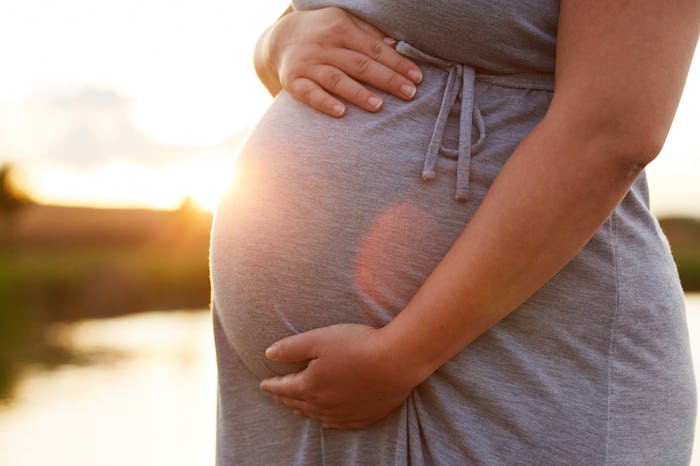Life

Summer Or Winter, It's Worth Asking: Can You Be In The Sun When You're Pregnant?
Pregnancy can feel like an exercise in deprivation: no raw fish, no alcohol, no sleeping on your stomach, no espresso, and no walking in high heels? I mean, the list is endless. And just when you think it is safe to enjoy something regular, like going out for a stroll on a warm day, a well-meaning stranger says something like, "Are you sure you should be out here?" But is this really something you need to worry about? Can you be in the sun when you're pregnant? Will bad things happen to you if you become exposed to the sun's rays? If you're pregnant and not interested living life as a hermit for 40 weeks (more or less), here's what you need to know in order to shed some "light" on the subject (come here for the information, stay for my awesome dad jokes).
Experts not only recommend pregnant women get some sun exposure, they actually encourage it. Why? Well, expecting mothers need Vitamin D, both for their own wellbeing and that of their baby' . Sure, you can take prenatal vitamins, but as the American Pregnancy Association (APA) reports, the average prenatal vitamin only contains 400 IU of vitamin D. A recent study found that the full benefits for pregnant women required that they take 4,000 IU of the supplement daily. In addition to taking the right amount of Vitamin D in your supplement, and eating Vitamin D-rich foods, the APA cites research that suggests how, "sensible sun exposure (usually five-10 minutes of exposure of the arms and legs or the hands, arms, and face, two or three times per week) can help as well."
Regardless of whether you're carrying a bun in the oven, sun exposure can lead to premature aging (no thanks) and malignant melanoma (i.e. scary horrible cancer). Melanoma, the deadliest of skin cancers, can begin during pregnancy, too. But, as the American Academy Of Dermatology's (AAOD) website states, being pregnant doesn't seem to increase the risk of developing melanoma (as some people erroneously believe). The AAOD explains further, saying:
"It’s just that this skin cancer develops during a woman’s child-bearing years. Today, more women between the ages of 20 and 40 are getting melanoma."
The good news is, melanoma can be treated during pregnancy. This is a nice lesson in remembering that correlation does not equal causation, before you start going into Freakout Mode.
There have been some rumblings among the scientific community about sun exposure and folic acid deficiency, but, as the APA states, they have not been conclusive. Folic acid deficiency is worrying because folic acid prevents neural tube defects (note: neural tube defects usually develop in the first 28 weeks of pregnancy), such as spina bifida, and is especially important in the first trimester.
The sun can also exacerbate existing skin changes from pregnancy. As explained on the Mayo Clinic's website, hormonal changes can result in an increase in melanin in your skin. So if you're wondering where those brown patches on your face (chloasma) are coming from, you can thank your hormones. Sun exposure, however, can make those patches far worse. If there was ever a reason to stay in the shade, wear a big ol' hat, and slather on some sunscreen, medicine can at least appeal to your superficial side, right?
Let's also take a moment to talk about the dehydrating effects of sun exposure. Depending on where you live, or what the level of sun exposure you're getting is, drinking lots of fluid should be a high priority. The Mayo Clinic recommends expecting mothers to drink 10 cups (2.4 liters) of fluids every single day. If you're sweating buckets in the sun, you will likely have to modify this to make up for your water loss.
Final answer? As a pregnant person, you need some sun exposure, but you need to do it responsibly. That means, not to the point when you become dehydrated or sunburned. It also means that when you're out in the sun and soaking up that Vitamin D, you'll want to wear sunscreen, avoid being in the sun's hot rays for too long, seek out some shade, and wear protective clothing and hats. (Hats are key.) Here's some free sartorial advice: the bigger the hat, the smaller your bump. You're welcome.
Watch Romper's new video series, Romper's Doula Diaries:
Check out the entire Romper's Doula Diaries series and other videos on Facebook and the Bustle app across Apple TV, Roku, and Amazon Fire TV.